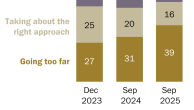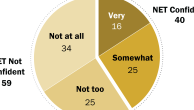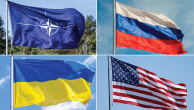Israelis perceive several obstacles to lasting peace between Israelis and Palestinians.
Seven-in-ten or more say lack of trust between Israelis and Palestinians and the status of Jerusalem are major obstacles to peace. Smaller shares say the same about Israeli settlements in the West Bank (52%), conflict between the Israeli left and right (43%), and conflict between Hamas and Fatah (34%).
Jews and Arabs in Israel differ in what they consider major obstacles. For example, 82% of Jews say lack of trust between Israelis and Palestinians is a major obstacle, compared with 44% of Arabs.
And there is no consensus among the Israeli public as to whether Jewish settlements in the West Bank help (44%) or hurt (35%) security in Israel. Roughly half of Jewish Israelis (53%) say the settlements help the security of their country, compared with 9% of Arab Israelis. The share of the Israeli public – and Israeli Jews in particular – saying settlements help Israel’s security has grown since we first asked the question in 2013.
What are the obstacles to peace?
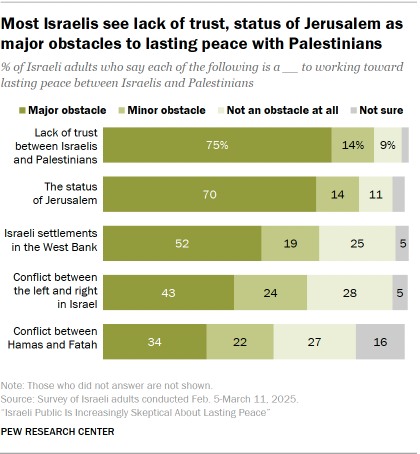
Most Israelis see lack of trust between Israelis and Palestinians as an obstacle to peace between the two groups, with three-quarters describing it as a major obstacle.
Seven-in-ten Israelis say the status of Jerusalem – a city that both Israelis and Palestinians claim as their capital – is a major obstacle.
About half of Israelis say the settlements in the West Bank are a major obstacle to peace (52%), while a quarter say they are not an obstacle at all.
Fewer see conflict between the left and right in Israel as a major obstacle to peace: 43% describe it as such, with another 24% describing it as a minor obstacle and 28% saying it is not an obstacle.
Around a third of Israelis (34%) say conflict between Hamas and Fatah is a major obstacle to peace.
Views by ethnicity
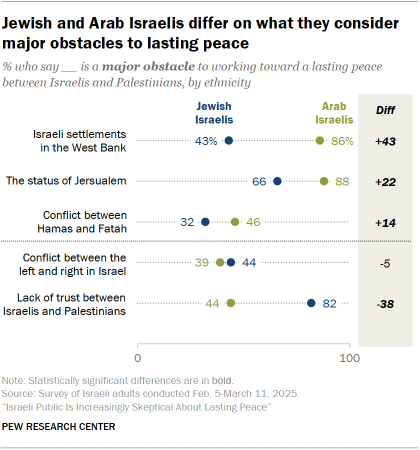
Most Israeli Arabs (86%) say Israeli settlements in the West Bank are a major obstacle to lasting peace, while 43% of Israeli Jews say the same.
Views are nearly reversed when it comes to lack of trust between Israelis and Palestinians. Most Israeli Jews (82%) say this is a major obstacle, compared with 44% of Israeli Arabs.
Majorities in both ethnic groups see the status of Jerusalem as a major obstacle to peace, though Israeli Arabs are more likely to say this than Israeli Jews (88% vs. 66%). Arabs are also more likely than Jews to call conflict between Hamas and Fatah a major obstacle (46% vs. 32%). Notably, 18% of Jews say they are not sure about the conflict between Hamas and Fatah.
Similar shares of Israeli Jews (44%) and Israeli Arabs (39%) say conflict between the political left and right in Israel is a major obstacle to lasting peace.
Views by Jewish religiousness
Among Jewish religious groups, roughly equal shares say political conflict on both the Israeli and Palestinian sides are major obstacles to peace.
But there is less agreement on West Bank settlements and the status of Jerusalem. Around half of Hilonim (56%) say Israeli settlements are a major obstacle to peace, compared with 35% of Masortim and 35% of Haredim and Datiim.
And on the question of Jerusalem, at least seven-in-ten Hilonim (72%) and Haredim and Datiim (70%) say the city’s status is a major obstacle to peace. Masortim are less likely to express this view (52%).
Large majorities across these Jewish religious groups say lack of trust between Israelis and Palestinians is a major obstacle to peace, but Haredim and Datiim (76%) are slightly less likely to think so than Masortim (88%) or Hilonim (84%).
Views by ideology
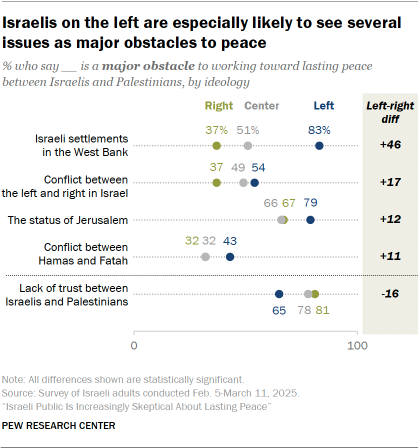
Israelis on the ideological left are more likely than those on the right to see several issues as major obstacles to lasting peace, including settlements, the status of Jerusalem, and conflicts in Israeli and Palestinian politics.
The only exception is lack of trust between Israelis and Palestinians – 65% of Israelis on the left say this is a major obstacle, compared with 78% of those in the center and 81% of those on the right.
Do settlements in the West Bank help or hurt Israel’s security?
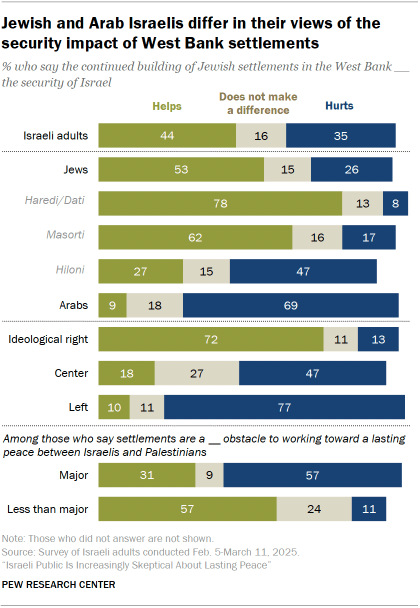
Many in Israel see West Bank settlements as an obstacle to peace, but the public is more divided on their role in national security: 44% say the continued building of settlements in the West Bank helps Israel’s security, 35% say it hurts security, and 16% say it does not make a difference.
The share of Israelis who say settlements help Israel’s security is not significantly different from what it was last year. But it has grown considerably from 27% in 2013, when the question was first asked. This shift is mostly led by Israeli Jews. About half of Jews (53%) say settlements help Israel’s security, up 22 points from 31% in 2013. The share of Israeli Arabs who agree has remained under 10% over this period.
Views by ethnicity
Jewish Israelis are much more likely than Arab Israelis to view settlements as helpful to their country’s security (53% vs. 9%). Nearly seven-in-ten Israeli Arabs say the settlements hurt Israel’s security – a position also taken by 26% of Israeli Jews.
Views by Jewish religiousness
Hilonim are much less likely than members of other Jewish groups to say the continued building of Jewish settlements in the West Bank helps Israel’s security. While 78% of Haredim and Datiim and 62% of Masortim say settlements help security, far fewer Hilonim (27%) take this position.
Views by ideology and perceptions of obstacles to peace
Israelis on the ideological right are particularly likely to say West Bank settlements help security (72%). Around one-in-five of those in the center (18%) and 10% of those on the left share this viewpoint. Among those on the left, around three-quarters (77%) say settlements hurt the security of Israel.
Israelis who say West Bank settlements are a major obstacle to peace are much more likely than Israelis who believe otherwise to say the settlements hurt Israel’s security.
